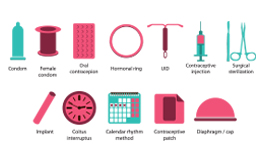
We love having options, don’t we? When it comes to birth control, we have plenty of them, and that’s good news. Yet, having so many choices can make it tough to decide which one best fits our lifestyle.
Raschelle Schowengerdt, MD, opens new tab, an OB/GYN with Meritas Health Obstetrics & Gynecology, opens new tab, focuses on educating women about contraception options. Below, she shares insights for choosing the method that syncs with our health, lifestyle and family plans.
What are the Top 3 factors women should consider when choosing a birth control method?
Dr. Schowengerdt: First, women need to think about the effectiveness of each method. Next, they should factor in how long they anticipate needing contraception. Finally, they should research each method’s typical bleeding pattern. Some methods ensure regular, predictable menstrual bleeding while others can potentially decrease or even eliminate it.
What are the most effective methods?
Dr. Schowengerdt: Long-acting reversible contraceptives (LARCs), such as intrauterine devices (IUDs) or implants, are as effective as having your tubes tied, but their effect is reversible. After the device is removed, fertility rapidly returns to what it was before it was placed.
Let’s talk about birth control after having a baby. When should women start thinking about it?
Dr. Schowengerdt: It’s never too early to talk about birth control after having a baby. In my practice, we discuss options at the beginning of the third trimester. This gives our patients time to review their options, and hopefully have a plan in place before the baby arrives.
How often should a women review her birth control options?
Dr. Schowengerdt: If you are unsatisfied with your current method or want to explore other options, talk to your OB/GYN. New methods become available all the time, and we can help you choose the method that best fits your needs.
What else would you like to add?
Dr. Schowengerdt: No one method works for all women, which is why we have so many choices. Talk to your doctor about all your options, and decide which one is the best for you.
Common Birth Control Options
- Cervical cap
- Condoms (available for men and women)
- Depo-Provera shot
- Diaphragm
- Fertility awareness ( aka natural family planning)
- Implant (Nexplanon)
- IUD
- Patch
- Pill
- Spermicide
- Sponge
- Tubal Ligation/Tubal Implants
- Vaginal ring
- Vasectomy
Related Articles

November 6, 2024
10000 Steps Good Enough
How many steps did you log today? It’s a popular question, and the gold standard answer is 10,000. Yet, depending on your health goals, you may need to pick up the pace.

May 31, 2019
5 Day Meal Prep
Who says eating healthy has to be difficult? One of our Registered Dietitians shows us how easy it can be to prep lunches for a busy week.

May 31, 2019
5 Foods With Health Benefits
Dark ChocolateBoost your mood and your memory (think antioxidants) by savoring dark chocolate. It may also help your heart health. Just 1 oz. is all it takes...

December 8, 2019
5 Free Indulgences
Are you ready for the hubbub of the holidays? The season’s festivities are always fun, but they can also wear you down. If your holiday spirit needs rechargi...

May 31, 2019
5 Minutes to a Happier You
Feeling stressed, angry or anxious? Head to the great outdoors. A new study has found that a five-minute walk can work wonders for your mood.The more natural...

July 26, 2022
5 Must Have Nutrients
Vitamins and minerals do a body good, but who has time to figure out which foods offer what benefits? This short list of five essential nutrients, opens new ...


